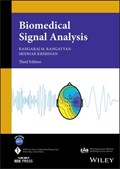Biomedical Signal Analysis
Comprehensive resource covering recent developments, applications of current interest, and advanced techniques for biomedical signal analysis
Biomedical Signal Analysis provides extensive insight into digital signal processing techniques for filtering, identification, characterization, classification, and analysis of biomedical signals with the aim of computer-aided diagnosis, taking a unique approach by presenting case studies encountered in the authors’ research work.
Each chapter begins with the statement of a biomedical signal problem, followed by a selection of real-life case studies and illustrations with the associated signals. Signal processing, modeling, or analysis techniques are then presented, starting with relatively simple “textbook” methods, followed by more sophisticated research-informed approaches. Each chapter concludes with solutions to practical applications. Illustrations of real-life biomedical signals and their derivatives are included throughout. The third edition expands on essential background material and advanced topics without altering the underlying pedagogical approach and philosophy of the successful first and second editions. The book is enhanced by a large number of study questions and laboratory exercises as well as an online repository with solutions to problems and data files for laboratory work and projects.
Biomedical Signal Analysis provides theoretical and practical information on:
Biomedical Signal Analysis is an ideal learning resource for senior undergraduate and graduate engineering students. Introductory sections on signals, systems, and transforms make this book accessible to students in disciplines other than electrical engineering.

